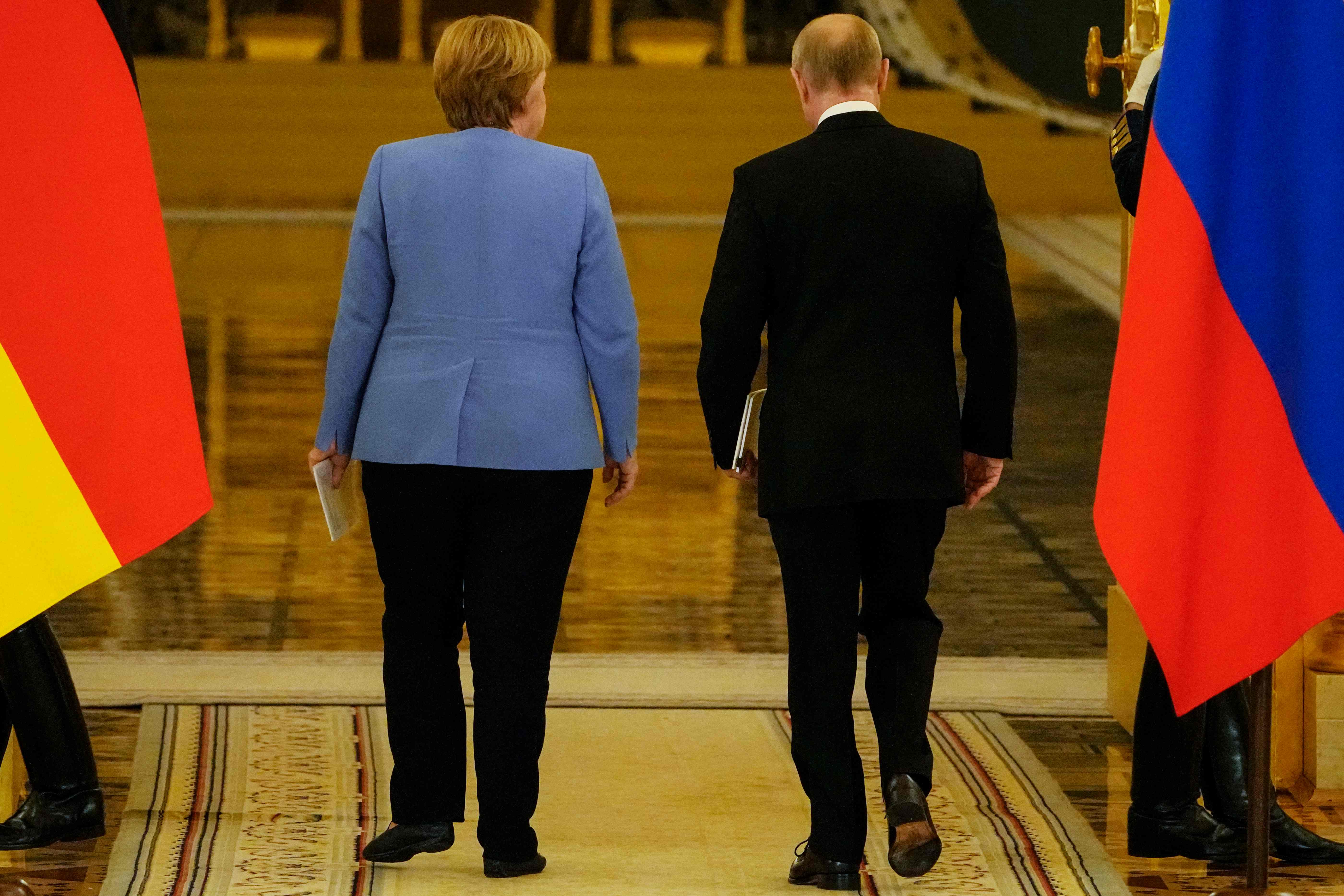End of an era as Angela Merkel meets Vladimir Putin for last time in Moscow
Merkel travelled to Russia for the final time as German leader on Friday

For the past two decades, their leadership roles have been intertwined – rivals, sometimes confidantes and undisputed political heavyweights – but on Friday Angela Merkel began the process of leaving centre stage to Vladimir Putin alone.
Ms Merkel insisted she hadn’t travelled to Moscow just to say goodbye. There was business to get down to: Afghanistan, bilateral relations, Ukraine. And on a day marking the one-year anniversary of the poisoning of opposition leader Alexei Navalny, there was also the small matter of his “arbitrary trial” and “unjust imprisonment”.
But her host preferred to emphasise the triumphant occasion. Fitting out the Kremlin’s opulent St Alexander Hall to host her – a first for any visiting leader – Vladimir Putin was even on time to present the 16-year chancellor with flowers.
“We will always be very pleased to see Ms Merkel in Russia even after she finishes her term,” Mr Putin told journalists at the end of three and a half hours of talks.
“She is respected as someone who with a sure hand ran one of Europe’s largest economies, and someone who goes down in history as one of the most authoritative European and world leaders.”
The two leaders certainly share common history, with careers the products of conflicting Europe’s post-war ideologies.
The German leader, daughter of an East German pastor, fluent in the language of Russian occupiers, became leader of the liberal West. The Russian president, KGB officer, fluent in the language of his East German posting, is increasingly the autocrat others want to emulate.
Ms Merkel has on occasion been a tough critic on Russia, but no other western leader has invested as much into close relations with its president. Over eight years between 2012 and 2020, the two leaders spoke by phone 67 times and met 34 times.
That dialogue was tested most notably over 2014 and 2015, when Mr Putin oversaw the annexation of Crimea and the start of undeclared war with Ukraine.
At one point, in an uncharacteristic display of frustration, Ms Merkel suggested her opposite number was “living in another world”. All the same, the German leader remained committed to searching for peace, overseeing tense negotiations in Minsk in February 2015.
Pavlo Klimkin, Ukraine’s foreign minister at the time, witnessed Chancellor Merkel and President Putin’s “close” relationship during 17 hours of negotiations.
He said he saw Merkel grow increasingly disappointed with her Russian counterpart. “At the start their interaction was good, but things became more difficult when she understood he had been lying to her about Ukraine,” he said. Mr Klimkin refused to elaborate with details, but said it left Ms Merkel “emotional”.
Other difficulties followed. An alleged Russian hack of the national parliament in 2015, reported five years later. The poisoning of double agent Sergei Skripal in Salisbury, UK, in 2018. The murder of a Chechen exile in central Berlin in 2019. In response, Ms Merkel became a leading proponent of joint sanctions against Russia.
“I try to improve the relations with Russia daily,” Ms Merkel said in 2020 in response to an investigation into the Bundestag hack, “but it’s unpleasant and outrageous”.
Despite the difficulties, Ms Merkel pushed hard to preserve trade and cultural ties with Moscow. German industry has grown inside Russia despite sanctions, with its corporations well represented in government infrastructure projects from hi-speed rail to energy pipelines. Last year, Germany was Russia’s second most important trading partner behind China.
On Friday, Mr Putin made note of those efforts, thanking his opposite number for maintaining “good business relations”.
Chancellor Merkel was “always ready to speak” to him, he said: “We haven’t always shared the same positions, but she always showed a readiness to compromise and resolve the most serious problems.”
Ms Merkel agreed: “Not to continue dialogue was never an option.”
Subscribe to Independent Premium to bookmark this article
Want to bookmark your favourite articles and stories to read or reference later? Start your Independent Premium subscription today.

Join our commenting forum
Join thought-provoking conversations, follow other Independent readers and see their replies